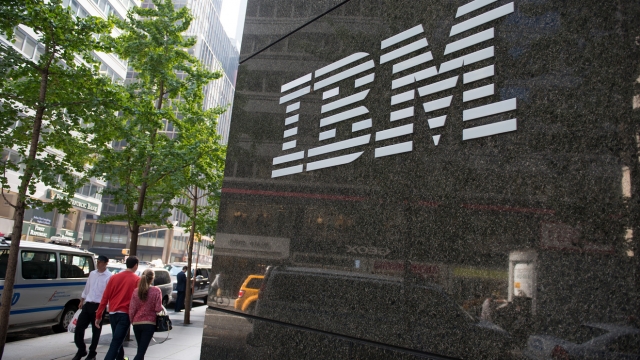
MarketWatch First Take: IBM earnings beat is a product of tax avoidance, and it’s nothing new
http://ift.tt/2x4vHOb
IBM Corp. somehow managed to maintain its rock-bottom effective tax rate in Tuesday’s earnings report, riding its continuing ability to avoid taxes to an earnings beat and after-hours stock gains.
IBM
managed to beat expectations for profit and sales despite revenue declining for a 22nd consecutive quarter, to $19.15 billion from $19.22 billion a year ago. Even coming that close to break-even helped IBM stock push higher in late trading by more than 5%, combating a slide that had seen shares decline 11.7% so far this year, as the S&P 500 index
has gained 14.3%.
The company’s profit also topped analyst estimates, at $2.92 a share against average expectations of $2.84 a share, thanks to an astonishingly low effective tax rate of 11%. Yes, you read that right, while the average American citizen pays about 30% of their income in taxes, IBM paid 11% of its profits out to governments in the third quarter, in which net income was more than $2.7 billion.
Honestly, it shouldn’t be a surprise anymore that IBM managed to post a low effective tax rate, which includes more than just federal corporate income taxes. As MarketWatch reported earlier this month, IBM has had the second-lowest median effective tax rate of the 30 Dow Jones Industrial Average
components over the past five quarters, with only General Electric Co.
getting away with paying less. One of seven Dow component companies to pay a tax rate lower than 20%, IBM has a median effective tax rate of 10% in the five quarters preceding the one it reported Tuesday, so apparently we should be thankful that it tacked on the extra 1% in that period.
Most U.S. corporations reduce taxes through various loopholes and money-losing divisions, corporate restructurings and other write-downs. Many also park revenue earned overseas in the country it was earned, rather than move those funds back to the U.S. and pay more taxes.
Don’t miss: Here are the actual tax rates the biggest companies in America pay
In IBM’s case, a discrete tax benefit of $582 million related to an intra-entity asset transfer — shuffling non-inventory like intellectual property between business units, an exercise for which accounting practices are changing and IBM chose to adopt the new approach early — gave it an effective tax rate of negative 23.1% in the first quarter of 2017, according to a regulatory filing. A big benefit like that can bring down average tax rates even when stretched out over several quarters.
IBM, however, is realizing much more than just that one-time gain. Before Big Blue announced another stunningly low effective tax rate three months ago, Kulbinder Garcha, then an analyst at Credit Suisse First Boston, noted that IBM’s effective tax rate “has been a key driver in cushioning the drastic decline in underlying profits since 2014.”
See also: Amazon, Apple, Google and Facebook will all go away within 50 years, author says
Garcha said that IBM is engaging in deferring taxes, which he called an aggressive tax practice, and said IBM’s tax rate had helped the company’s earnings materially on average about 7% over the last three years. He said IBM’s tax rate then was the lowest among large-cap tech companies, and called the gains unsustainable.
IBM doesn’t seem to think that its ability to put up a low effective tax rate is going away soon, however. On the company’s call with analysts Tuesday, Chief Financial Officer Martin Schroeter said IBM’s ongoing operational tax rate would remain in the range of 15%, plus or minus three points, keeping it at about half the going corporate tax rate in the U.S. of 35% even at the high end.
President Donald Trump has heralded a reduction in the 35% corporate tax rate as a way to help businesses and investors, with a targeted rate of 20%. IBM is already effectively paying less than 20% in global taxes, however, while raking in billions in profit and pushing a good portion of that money back out in stock buybacks to further cushion its earnings.
The question for those looking at corporate tax reform is how to iron out the loopholes while cutting the overall rate to avoid even larger deficits than the U.S. is facing right now. The question for IBM and its investors is how much longer Big Blue can continue to pad its profits by avoiding taxes, and if there will ever be a reckoning for its current practices.
business
via MarketWatch.com – Top Stories http://ift.tt/dPxWU8
